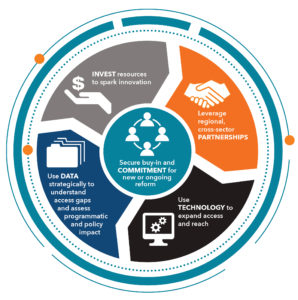Putting Learner Success First: A Shared Vision for the Future of CTE lays out a reality where all learners have access to a high-quality education that leads to rewarding career opportunities and can gain the skills they need, when they them, without the limitations of place or time. Yet in too many states, learners in rural communities are less likely to have access to Career Technical Education (CTE) pathways, experiences and supports than their peers in suburban or urban areas.
Given the unique challenges to expanding CTE on the “frontier,” Advance CTE launched a year-long initiative to unpack the biggest barriers and identify promising practices from across the country. Based on interviews with over a dozen state secondary and postsecondary leaders – in addition to local practitioners and national experts – Advance CTE released a series of four briefs with short case studies on states’ approaches to addressing the most pressing challenges to expanding access to high-quality CTE pathways in rural communities.
While this research and the embedded case studies can serve as a critical resource for states as they advance their own priorities and policies to address gaps in rural CTE pathways and experiences, it also shined a light on how interwoven each of these challenges are and the need for states to address all of them comprehensively and collaboratively.
To support such efforts, Advance CTE has released its CTE on the Frontier: Rural CTE Strategy Guide. This tool offers series of questions for state leaders to use as they reflect on current efforts to expand access to high-quality CTE and career-focused pathways and experiences in rural communities and to identify future opportunities and actions. While many of the questions may be difficult to answer at this time, those unanswerable questions can provide a lot of direction for a state’s next steps, including data to gather and partners to engage.
Advance CTE has also released a companion facilitation guide to help state leaders make the most of this resource and to support states’ efforts to address the five cross-cutting elements of a rural CTE strategy.
Want to learn more? Join us for a webinar on the CTE on the Frontier research and lessons learned on May 17. Register today!
CTE on the Frontier briefs:
- Ensuring that all CTE pathways are of the highest quality (ft. Nebraska, South Dakota, Idaho and Mississippi);
- Connecting rural learners to the world of work (ft. West Virginia, Louisiana, Montana and North Dakota) ;
- Providing diverse pathway options (ft. Idaho, Nebraska, Alaska and North Dakota); and
- Strengthening the rural CTE teacher pipeline (ft. Kentucky, Louisiana, Missouri, Mississippi and Hawaii).
CTE on the Frontier was developed through the New Skills for Youth initiative, a partnership of the Council of Chief State School Officers, Advance CTE and Education Strategy Group, generously funded by JPMorgan Chase & Co.
Kate Kreamer, Deputy Executive Director
